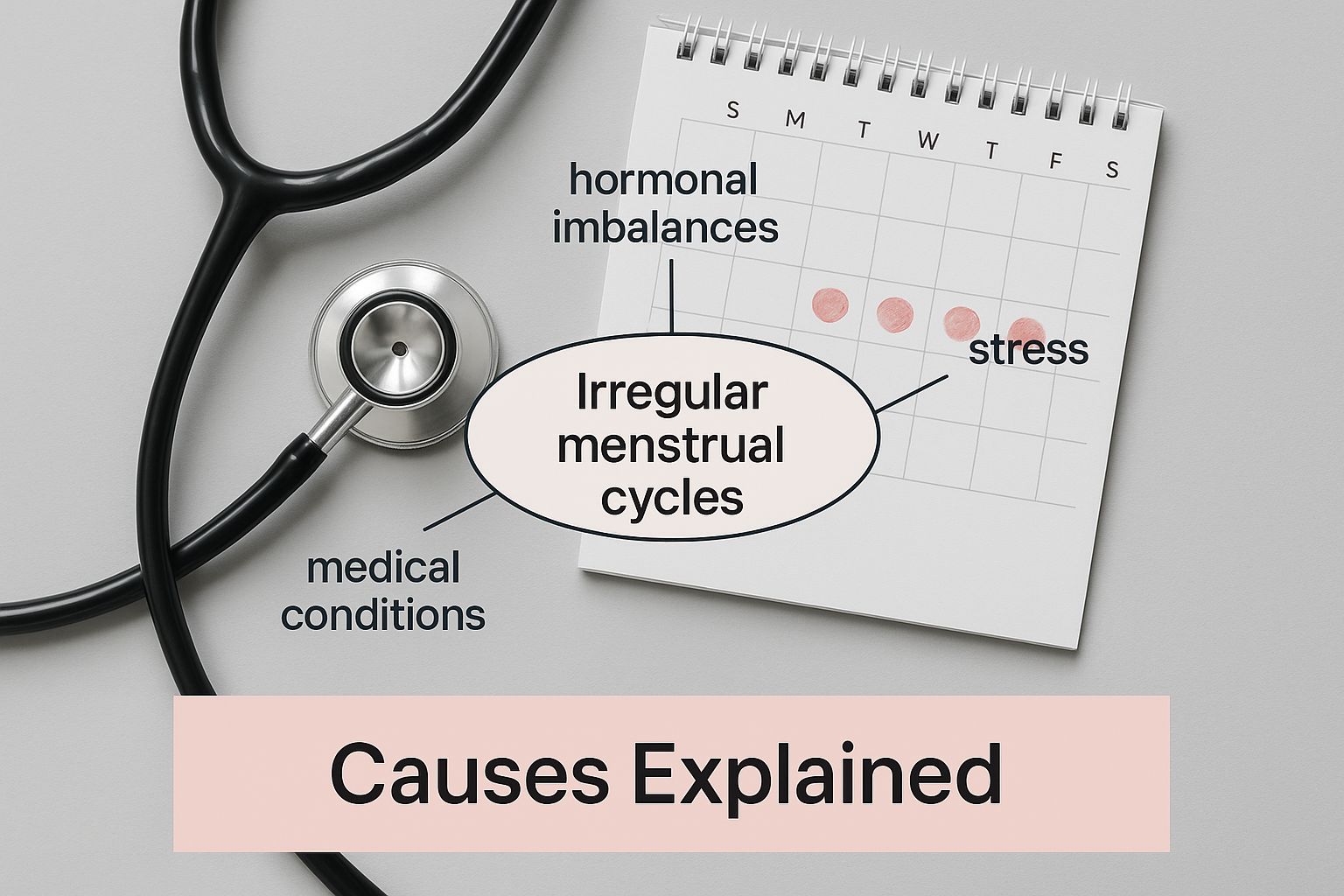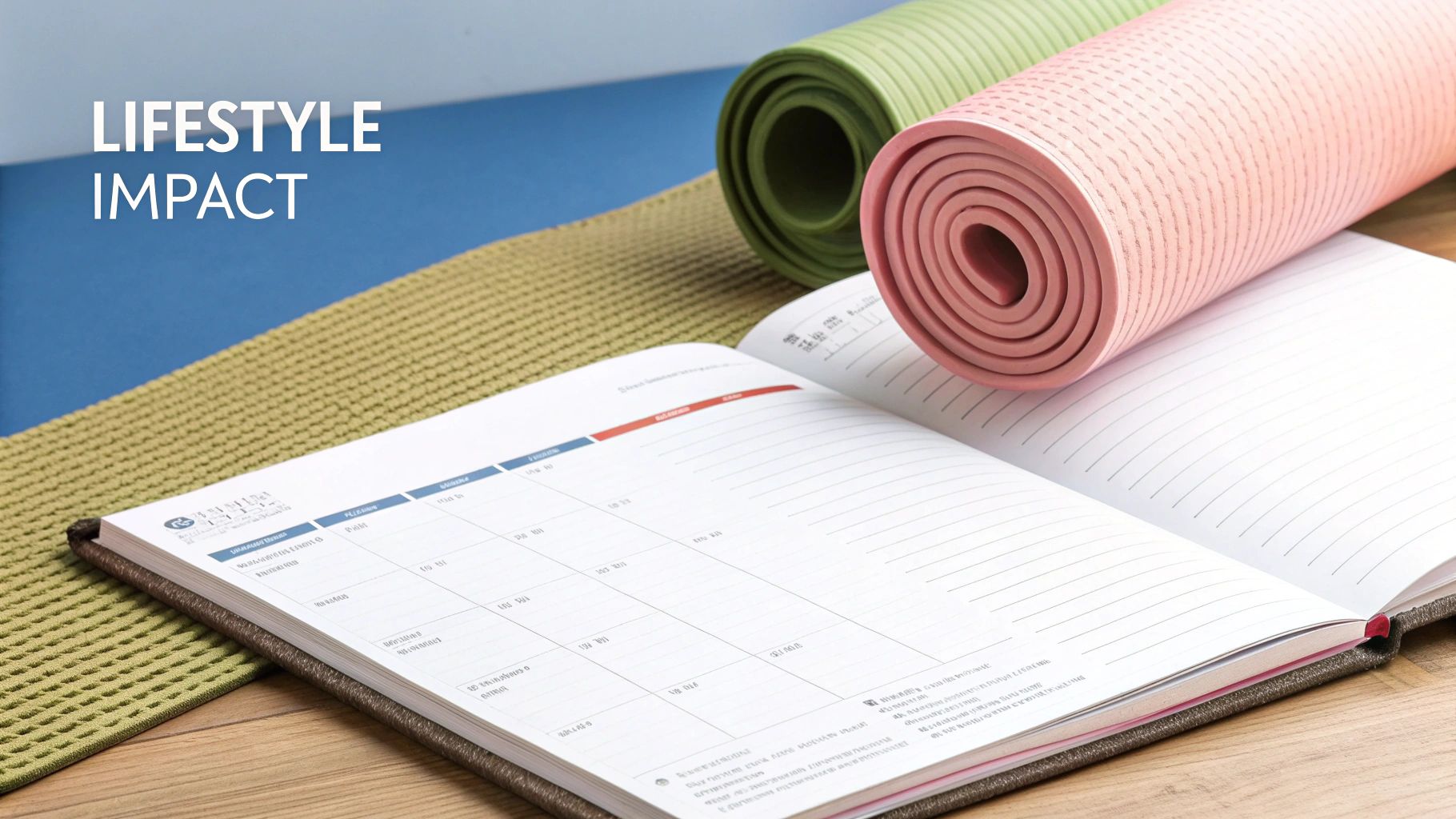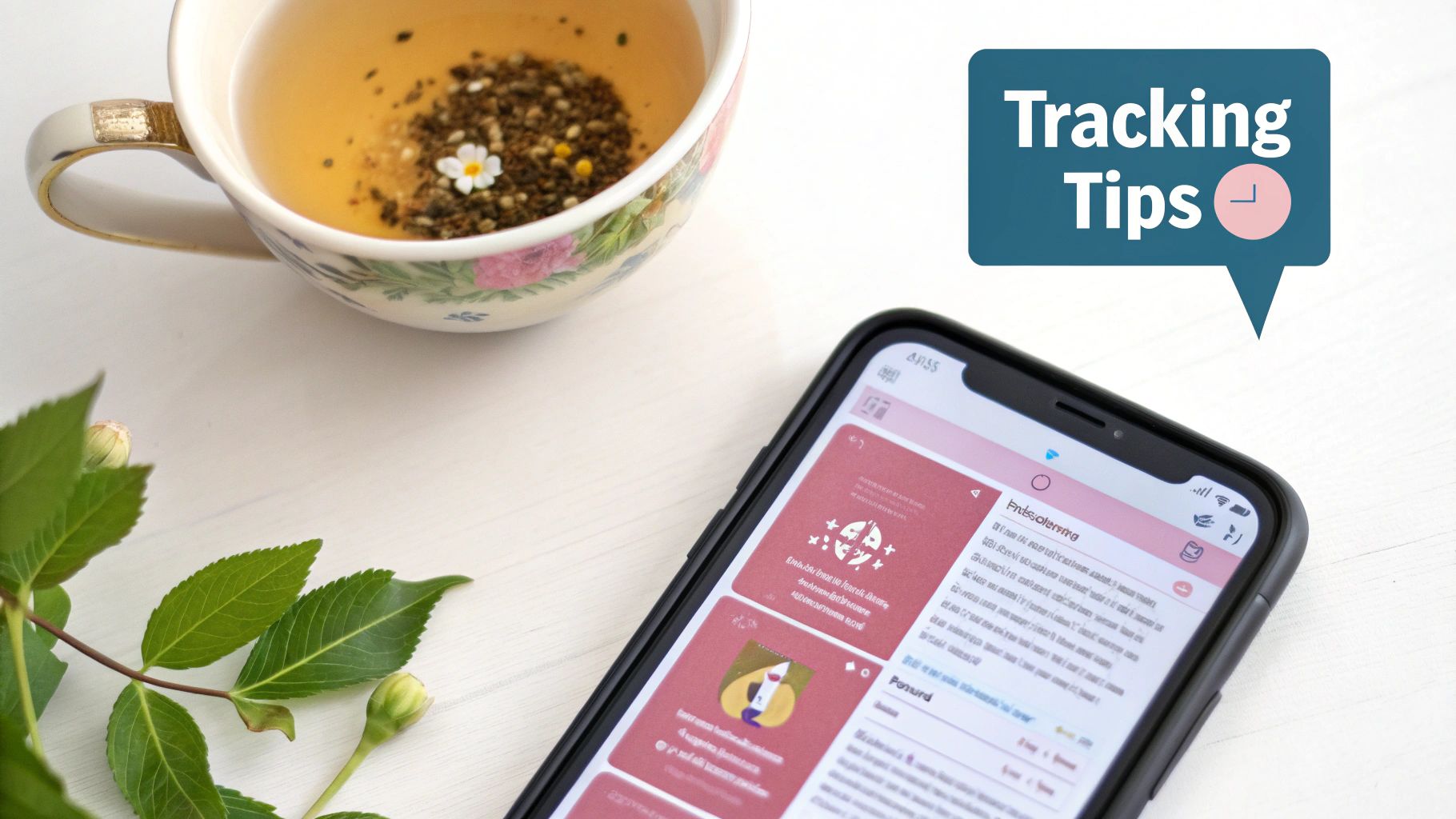
Why Is My Period Early? Unpacking the Causes
Share
That moment of surprise when your period shows up ahead of schedule can be unsettling. Is this normal? Should you be concerned?
First, take a breath. An early period is an incredibly common experience, and it rarely signals a serious issue. Think of your menstrual cycle less like a rigid calendar and more like a responsive system that reflects your overall wellbeing.
Your body is constantly adapting to internal and external changes. Simple things like a stressful week at work, travelling across time zones, or even switching up your fitness routine can temporarily alter the delicate hormonal dance that governs your cycle. This can easily cause your period to arrive a few days sooner than expected.
Understanding Your Menstrual Cycle
So, what exactly counts as "early"? Let’s break it down in a friendly way.
What Is Considered an Early Period?
A typical menstrual cycle lasts anywhere from 21 to 35 days. A period is generally considered ‘early’ if it arrives more than three days before you anticipated it. For many, especially in the years after menstruation first begins, cycle length can vary quite a bit.
It's completely normal for your cycle to fluctuate now and then.
The experience of an early or irregular cycle is particularly common among young people. For instance, while the average age for a first period in New Zealand is around 13, national data shows that about one in 16 girls begin menstruating while still in primary school. Understanding these variations helps normalise the experience. Learn more about these findings on menstruation in New Zealand.
The key is to pay attention to your own unique patterns. A single early period is usually just a blip on the radar. However, if you notice your cycle is consistently shorter than 21 days or becomes persistently irregular, it’s worth exploring the potential causes, which we will delve into throughout this guide.
The Science Behind Your Menstrual Cycle
To figure out why your period might show up early, it helps to get a handle on the amazing system that runs it. Think of your menstrual cycle as a finely tuned orchestra, with hormones acting as the conductors. When something throws off their timing, the whole performance can shift.
The entire show is run by two main hormones: estrogen and progesterone. Their levels rise and fall in a rhythmic pattern all month long, sending constant signals between your brain, ovaries, and uterus. It's this non-stop communication that decides when your period starts and stops.
The Four Phases of Your Cycle
Your menstrual cycle is split into four distinct phases, and a hiccup in any one of them can bring your period on sooner than expected.
- Menstruation: This is the part you know best—your period. It kicks off the cycle and happens when your uterus sheds its lining because a pregnancy didn't happen.
- Follicular Phase: Right after your period, your body gets busy preparing for a potential pregnancy. Estrogen levels climb, which thickens the lining of your uterus and gets an egg ready for release.
- Ovulation: This is the main event. A surge in hormones tells one of your ovaries to release a mature egg, usually around the middle of your cycle.
- Luteal Phase: After ovulation, progesterone takes over. Its job is to keep the uterine lining thick and cosy, just in case a fertilised egg needs a place to implant. If no pregnancy occurs, hormone levels drop, and the whole cycle starts over again with menstruation.
If you want to dive deeper into what's happening at each stage, our detailed guide to the 4 phases of the menstrual cycle is a great place to start. Getting familiar with this flow is the first step to understanding why your own schedule might go off-script.
This infographic breaks down some of the most common reasons a period might arrive ahead of schedule.

As you can see, it's often a mix of hormonal shifts, lifestyle factors, and underlying health issues that can influence your cycle's timing.
Your Hormones Tell a Story
That delicate dance between estrogen and progesterone is the secret to a predictable cycle. But when outside influences like stress, travel, or a change in diet enter the picture, they can interrupt the hormonal conversation. This can easily confuse your body, causing it to kick off the next phase—your period—sooner than planned.
To get a clearer picture of your own unique hormonal patterns, you might want to look into at-home hormone level testing options. Understanding your body's baseline can give you powerful insights into what might be influencing your period's timing, which is exactly what we'll explore next.
Common Lifestyle Triggers for an Early Period
While hormonal fluctuations are the scientific ‘what’, our daily habits are often the ‘why’ behind an unexpectedly early period. Your body is incredibly attuned to its environment, and even small shifts in your routine can nudge your menstrual clock off its usual rhythm.
Often, the answer to “why is my period early?” is sitting right in your everyday life. Let's explore some of the most common lifestyle factors that can influence your cycle.
When Stress Messes with Your Cycle
We’ve all been there—a looming deadline, a tough exam week, or a stressful family situation. When you’re under pressure, your body releases a hormone called cortisol. Think of it as your body's built-in alarm system.
While helpful in short bursts, chronically high levels of cortisol can interfere with the production of your key reproductive hormones, oestrogen and progesterone. This hormonal disruption can shorten your luteal phase—the time between ovulation and your period—causing your period to show up ahead of schedule.
How Exercise and Nutrition Play a Role
Your body loves consistency, especially when it comes to energy. Any sudden or significant change in your exercise or diet can send a signal to your reproductive system that now might not be the best time for a potential pregnancy.
This can manifest in a few ways:
- Intense Exercise: Suddenly starting a high-intensity workout regime can put your body under physical stress, affecting hormone levels and bringing on an early period.
- Significant Weight Changes: Both rapid weight loss and gain can disrupt the hormonal balance that regulates your cycle.
- Dietary Shifts: Drastically changing what you eat can also have an impact. Your body needs a steady supply of nutrients to produce hormones correctly.
Supporting your body with the right foods is a fantastic way to promote a more regular cycle. To learn more, check out our guide on foods that help support a healthy menstrual cycle for some great, practical tips.
Here’s a quick breakdown of how these everyday factors can knock your cycle off-course.
| How Everyday Factors Can Influence Your Cycle | ||
|---|---|---|
| Lifestyle Factor | How It Can Cause an Early Period | What You Can Do |
| High Stress | Increases cortisol, which can interfere with reproductive hormones and shorten your luteal phase. | Incorporate calming activities like yoga, meditation, or even just a 10-minute walk outside. |
| New, Intense Exercise | Puts physical stress on the body, disrupting the hormonal signals that regulate your cycle. | Ease into new fitness routines gradually to give your body time to adapt. |
| Big Diet Changes or Weight Fluctuation | Can create a nutritional or energy deficit, signalling to your body that it's not an ideal time for pregnancy. | Focus on balanced, nutrient-dense meals and aim for gradual, sustainable changes. |
| Jet Lag or Travel | Disrupts your circadian rhythm (internal body clock), which influences hormone release and timing. | Try to adjust to your new time zone as quickly as possible and prioritise sleep. |
The key takeaway is that your menstrual cycle is a sensitive barometer of your overall wellbeing. Small, consistent actions to manage stress and nourish your body can make a huge difference.
Travel and Your Internal Clock
Ever noticed your period arrives early after a long-haul flight? You’re not imagining it. Travelling across different time zones can throw off your circadian rhythm, which is your body’s internal 24-hour clock.
Your circadian rhythm doesn't just manage your sleep-wake cycle; it also influences the release of reproductive hormones. When this internal clock is disrupted by travel, it can easily lead to a temporary shift in your menstrual timing.
This effect is usually short-lived. Once your body adjusts to the new time zone, your cycle should return to its normal pattern.
The Natural Shift of Perimenopause
For those in their late 30s or 40s, an early period can be one of the first signs of perimenopause. This is the natural transition phase leading up to menopause, where your hormone levels begin to fluctuate more erratically.
During this time, your ovaries start producing less oestrogen, which can lead to shorter, longer, or more irregular cycles. An early period is a very common and expected part of this life stage. While it can feel unpredictable, it's simply your body beginning a new chapter.
Health Conditions That Can Affect Your Cycle
While lifestyle tweaks often get a rogue early period back on track, a pattern of consistently shorter cycles can sometimes be your body's way of flagging an underlying health issue. This isn’t about causing alarm—it’s about empowering you with knowledge so you can walk into a doctor's office feeling confident if you notice something’s up.
Think of your menstrual cycle as a barometer for your overall health. When something is out of balance internally, your period is often one of the first things to show it.
Common Conditions and Their Impact
Several health issues can interfere with the delicate hormonal dance that runs your cycle, leading to periods that show up ahead of schedule.
-
Polycystic Ovary Syndrome (PCOS): This is a really common hormonal condition where small cysts might form on the ovaries. PCOS can throw ovulation off schedule, leading to irregular cycles—sometimes shorter, sometimes much longer, and sometimes they go missing altogether.
-
Thyroid Imbalances: Your thyroid is the master of your metabolism, but it also has a huge say in your reproductive hormones. If it's underactive (hypothyroidism) or overactive (hyperthyroidism), it can easily cause menstrual chaos, including an early period.
-
Uterine Fibroids: These are non-cancerous growths that can pop up in or on the uterus. Depending on where they are and how big they get, fibroids can lead to heavier bleeding, more intense cramps, and can sometimes shorten your cycle, making your period arrive sooner than expected.

It’s worth remembering that these conditions usually come with other signs. Paying attention to your whole body—not just how long your cycle is—can give you some valuable clues.
"A consistent pattern of early periods, especially when paired with other new symptoms like unusual fatigue, pain, or changes in bleeding, is a clear signal that it's time to check in with a doctor."
These kinds of health challenges really bring home the importance of period equity and access to information here in New Zealand. A recent survey found that a staggering 27% of students report missing school because of their period and related symptoms, which just goes to show how much menstrual health can impact daily life. You can read more about the findings on menstrual health in NZ schools.
Seeking Professional Guidance
If you’re starting to think your early periods might be tangled up with a hormonal issue, the best next step is always a chat with your doctor or healthcare provider. They can help get to the bottom of what’s going on and talk through what to do next.
If hormonal imbalances seem to be part of the picture, a professional might suggest looking into natural ways to support your system, which could include specific hormone imbalance supplements.
At the end of the day, you are the expert on your own body. Noticing a change and asking questions is the most powerful step you can take for your health and wellbeing.
Navigating Period Care in New Zealand
An unexpected early period can be a bit of a scramble, but having the right support and products on hand makes everything feel more manageable. Navigating period care here in Aotearoa is all about knowing your options and understanding the bigger conversations happening around menstrual wellbeing.
When your cycle decides to show up early, being prepared is your best friend. A lot of people love having discreet and reliable options they can tuck into a bag or pocket. This is where products like digital (non-applicator) tampons really shine—they're compact and give you dependable protection right when you need it.
The Bigger Picture of Period Equity
Beyond just what you keep in your handbag, there's a growing movement for period equity in New Zealand. Let's be real: menstruation isn't always easy or comfortable. A nationwide survey actually highlighted that a staggering 89% of young Kiwi women experience regular dysmenorrhea (painful periods), which can sometimes go hand-in-hand with early or irregular bleeding. You can read more about the research on menstrual health symptoms if you're curious.
These challenges are a huge reason why making sure everyone has access to period products is so critical. When you can’t get the products you need, it can get in the way of your work, your studies, and your confidence. This issue, often called period poverty, is a very real barrier for many people.
Period equity is about so much more than just products; it's about making sure everyone can manage their period with dignity, safety, and without shame or financial stress.
Thankfully, New Zealand is making some incredible strides in this space. One of the biggest steps forward has been the initiative to provide free period products in schools right across the country. This move directly tackles period poverty where it can have a massive impact, helping students stay in class and focus on their education without that extra worry. You can discover more about the positive changes from free period products in NZ.
This initiative doesn't just provide products; it helps normalise conversations around menstruation and tackles common struggles head-on. By understanding the broader context of period equity, your personal experience of managing an early period connects to a larger community effort. It’s a shared journey towards ensuring everyone in New Zealand has the support they need to manage their menstrual health with confidence and dignity, no matter when their period arrives.
When to See a Doctor About Your Period
While an occasional early period is usually just your body responding to life, it’s also important to listen when it might be signalling something more. Knowing when to check in with a healthcare professional can give you peace of mind and ensure you stay on top of your health.

There’s no need to feel anxious about making an appointment; it's a proactive step towards understanding your body. Your doctor has seen it all before and is there to help.
Key Signs It's Time for a Chat
Generally, it’s a good idea to book a visit with your GP if you notice a consistent pattern of change. A one-off early period isn’t a red flag, but if your cycle remains unpredictable for several months, it's worth investigating.
Consider seeking advice if you experience any of the following:
- Consistently Early Periods: Your period arrives early for three or more consecutive cycles.
- Significant Changes: You notice a sudden increase in menstrual pain, much heavier bleeding than usual, or bleeding that lasts longer than seven days.
- Bleeding Between Cycles: Spotting or bleeding when you’re not expecting your period can be a reason to get checked out.
- New or Concerning Symptoms: If your early period comes with other symptoms like severe fatigue, dizziness, or unusual vaginal discharge.
Having clear information makes for a much more productive conversation with your doctor. Tracking your cycle—noting start dates, flow heaviness, and any other symptoms—can provide valuable clues.
This simple preparation helps your doctor get a clearer picture of what’s happening, making it easier to answer your question "why is my period early?" with personalised advice.
Got Questions About Early Periods? We've Got Answers.
It can be a little unsettling when your cycle throws you a curveball. If your period has shown up ahead of schedule, you probably have a few questions. Here are some straightforward answers to the most common ones we hear.
Can Stress Really Make My Period Come Early?
Yes, absolutely. When you’re under a lot of pressure, your body pumps out cortisol—its main stress hormone. That cortisol can directly mess with the delicate hormonal dance between oestrogen and progesterone that runs your cycle, sometimes causing it to shorten and kick off your period sooner than you expect.
Should I Worry About One Early Period?
In most cases, a single early period isn't a red flag. Your body isn't a clock, and small fluctuations are totally normal. It's often just your system's way of reacting to things like travel, a hectic week at work, or even a change in your diet. The key is to look for a consistent pattern, not a one-off event.
If your periods are regularly showing up early for three or more cycles in a row, or if the change comes with other new symptoms like severe pain, it’s a good idea to have a chat with your doctor.
Could an Early Period Actually Be Implantation Bleeding?
It's possible, but they feel quite different. Implantation bleeding is usually very light—think spotting, not a real flow—and is often pink or brown. It can happen when a fertilised egg attaches to the uterine lining, typically about 10-14 days after conception, which can sometimes line up with when you might be expecting your period.
If you’ve had unprotected sex and you’re seeing some very light, early bleeding that doesn’t develop into your usual period, taking a pregnancy test is the clearest way to find out what's going on.
At Crimson Organic, we believe that being prepared for your period—whenever it decides to arrive—is a form of self-care. Our certified organic cotton tampons offer reliable, chemical-free protection, so you can feel confident and comfortable no matter what your cycle brings. Explore our range of premium period care at https://crimsonorganic.co.nz.
